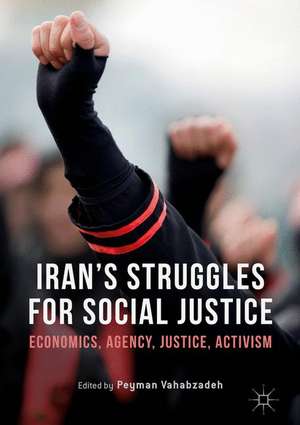Iran’s Struggles for Social Justice: Economics, Agency, Justice, Activism
Editat de Peyman Vahabzadehen Limba Engleză Hardback – 27 dec 2016
| Toate formatele și edițiile | Preț | Express |
|---|---|---|
| Paperback (1) | 586.38 lei 6-8 săpt. | |
| Springer International Publishing – 12 iul 2018 | 586.38 lei 6-8 săpt. | |
| Hardback (1) | 644.95 lei 6-8 săpt. | |
| Springer International Publishing – 27 dec 2016 | 644.95 lei 6-8 săpt. |
Preț: 644.95 lei
Preț vechi: 758.77 lei
-15% Nou
Puncte Express: 967
Preț estimativ în valută:
123.41€ • 128.85$ • 102.14£
123.41€ • 128.85$ • 102.14£
Carte tipărită la comandă
Livrare economică 04-18 aprilie
Preluare comenzi: 021 569.72.76
Specificații
ISBN-13: 9783319442266
ISBN-10: 3319442260
Pagini: 364
Ilustrații: XXIII, 323 p. 1 illus. in color.
Dimensiuni: 148 x 210 x 24 mm
Greutate: 0.54 kg
Ediția:1st ed. 2017
Editura: Springer International Publishing
Colecția Palgrave Macmillan
Locul publicării:Cham, Switzerland
ISBN-10: 3319442260
Pagini: 364
Ilustrații: XXIII, 323 p. 1 illus. in color.
Dimensiuni: 148 x 210 x 24 mm
Greutate: 0.54 kg
Ediția:1st ed. 2017
Editura: Springer International Publishing
Colecția Palgrave Macmillan
Locul publicării:Cham, Switzerland
Cuprins
Preface.- Introduction. How to Approach This Book.- 1. Historical and Conceptual Preparations for a Multidisciplinary Study of Social Justice in Iran.- 2. Gazing Upon the Land of Oil Through the Prism of Structure, Elite Action, and Civil Society.- 3. The Unmaking of the Iranian Working Class since the 1990s.- 4. Charity or Mass Mobilization? Public Religion and the Struggle for Economic Justice.- 5. Iran’s Cooperative Movement: Agony of Development.- 6. Social Justice, Anti-imperialist, Racist, Persiancentric, and Shi‘i-centric Discursive Formations of the Ideal Citizen, and Iranian School Textbooks: A Social Biography Response.- 7. Justice Interrupted: The University and the Imam.- 8. Ethical-Political Praxis: Social Justice and the Resistant Subject in Iran.- 9. Intergenerational Memory in Children of the Jacaranda Tree.- 10. Social Media as a Site of Transformative Politics and Political Dissent: Iranian Women’s Online Contestations.- 11. Performative agency: A Realization of anObjective Clash of ‘Social Justice’ Discourses or a Requiem for a Subjective Silence.- 12. The Voice of the Workers: Iran’s Labour Movement and Reflections on the Project-Seasonal Workers’ Union of Abadan, 1979-1980.- 13. An Unfinished Odyssey: The Iranian Student Movement’s Struggles for Social Justice.- 14. The Left’s Contribution to Social Justice in Iran: A Brief Historical Overview.- 15. Iran: Multiple Sources of a Grassroots Social Democracy?.- 16. Social Justice and Democracy in Iran: In Search of the Missing Link.- Afterword. Social Justice in Iran: Further Research.
Notă biografică
Peyman Vahabzadeh is Associate Professor of Sociology at University of Victoria, Canada. His recent books include A Guerrilla Odyssey: Modernization, Secularism, Democracy and the Fadai Period of National Liberation in Iran, 1970-1979 (2010), Exilic Meditations: Essays on A Displaced Life (2013), and Parviz Sadri: A Political Biography (2015; in Persian).
Textul de pe ultima copertă
This interdisciplinary volume offers a range of studies spanning the various historical, political, legal, and cultural features of social justice in Iran, and proposes that the present-day realities of life in Iran could not be farther from the promises of the Iranian Revolution. The ideals of social justice and participatory democracy that galvanized a resilient nation in 1979 have been abandoned as an avaricious ruling elite has privatized the economy, abandoned social programs and subsidy payments for the poor, and suppressed the struggles of women, workers, students, and minorities for equality. At its core, Iran’s Struggle for Social Justice seeks to educate and to develop a new discourse on social justice in Iran.
Caracteristici
Fills a gap in the research concerning Iran's post-revolutionary struggle for social justice Presents both secular and Islamic approaches to activism Explores the ways in which the Internet and social media have contributed to Iranian activists' outreach
